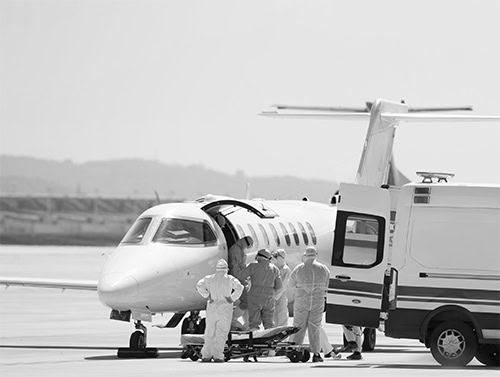Planning to go on a cruise this vacation? Looking forward to enjoying the sunkissed decks, delightful gourmet meals, comfortable cabins, and a crew that treats you with utmost care. With the experience of boundless horizons and the thrills of exploring cities at every stop, cruise ships also bring together travelers from different regions in a semi-confined space, becoming an ideal environment for infectious diseases to spread easily.
In the unique environment of a cruise ship, health concerns and potential medical incidents at sea are heightened. Passengers should be cautious about contagious diseases and pre-existing health conditions, and necessary precautions should be taken to avert possible emergencies onboard. Additionally, it’s crucial to confirm that your health insurance provides coverage for any contingencies that may arise before you start your journey. If the medical emergency exceeds the ship infirmaries’ capabilities, air ambulances may be called upon to provide advanced medical assistance and swift evacuation to suitable facilities ashore. Bluedot helpline is available 24X7 to assist you no matter where you are.
What to do when you get sick on the cruise?
In the event of a medical emergency during your cruise, your initial action should be to visit the ship’s medical center. Cruise lines ensure they have onboard medical facilities, staffed with experienced doctors and nurses, ready to provide treatment and care for any sickness or injury that might arise.
Most shipboard medical centers are well-equipped with essential medical equipment such as X-ray machines, stretchers, wheelchairs, EKGs, defibrillators, and cardiac monitors. The extent of available equipment may vary depending on the cruise line. The larger the ship, the greater the array of medical equipment they are likely to have on hand. Generally, cruise medical centers can effectively prescribe medications, carry out minor surgical procedures, and stabilize patients facing serious medical conditions.
In situations where your medical condition can be managed effectively onboard, you will receive the appropriate treatment. In cases involving contagious diseases, quarantine protocols are implemented and you shall be confined to your cabin.
What conditions can be treated on-board?
The range of medical emergencies and health issues commonly encountered aboard cruise ships encompass respiratory emergencies like asthma attacks and exacerbation of chronic obstructive pulmonary disease (COPD), infectious diseases, injuries, gastrointestinal problems, cardiovascular conditions, seasickness, allergies, dehydration, alcohol-related incidents, and heat stroke. Heart attacks, strokes, angina, and other heart-related problems, particularly among the elderly, account for nearly 80% of onboard fatalities.
In the case of a severe medical crisis necessitating care beyond onboard capabilities, medical evacuation from the ship becomes imperative. This applies to conditions requiring hospitalization, surgery, or life-saving interventions. Some such conditions include fractures, heart attacks, strokes, trauma, pulmonary issues, infectious diseases, and severe mental illnesses.
If you cannot be treated On-board
Ship infirmaries can stabilize critical patients and manage emergencies like heart attacks. However, their resources aren’t as comprehensive as onshore hospitals. If the ship’s doctor deems evacuation necessary, the ship’s captain is alerted. Depending on the location and severity of the condition, the ship may disembark the patient at the nearest port for proper emergency care or in rare cases alter course. Typically, the port chosen would have adequate medical facilities. If the necessary facilities are not available at the location or if the patient wants to get back home, or if the situation is deemed critical, helicopter evacuation (HEMS) or an air ambulance (MEDEVAC) from the nearest port is usually needed for medical evacuation or medical repatriation.
The role of Air Ambulances
Air ambulances often play a vital role in transporting patients who experience medical emergencies during cruises. When quality care is inaccessible or costly at the disembarkation site, or when repatriation is necessary, Air ambulances offer a swift and secure route back home. Air ambulance aircraft have advanced medical equipment including ICU capabilities, and trained medical teams to provide hospital-level intensive care, post-cruise emergencies, during transit.
For those stable enough to fly commercially but still needing medical oversight, Medical escorts are a cost-effective solution. These professionals accompany patients on flights, delivering treatment and care en route.
The Bluedot difference
Bluedot Air Ambulance’s EURAMI/CAMTS certified operators and the UMen network of aero-medical professionals worldwide, ensure that you receive only the best possible care, irrespective of the fact whether you choose to be repatriated by HEMS from the cruise ship, or MEDEVAC from a nearby port or if you require Medical Escort on a commercial flight. When it comes to patient care, we just do not compromise.
If you have more questions about air medical evacuation procedures, costs, and planning, feel free to write to us at: mail@bluedotassist.com or call/ WhatsApp chat with us at our 24×7 support number +971 551881441



